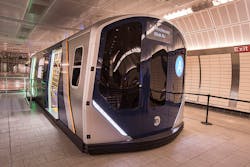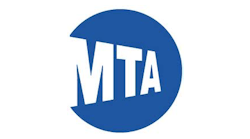MTA New York City Transit Acquiring Hundreds of Next-Generation Subway Cars to Improve Service
For the initial, base contract, Kawasaki will design and deliver 440 new closed-end cars for the B Division, 75 closed-end cars for Staten Island Railway, and 20 innovative open gangway cars as part of a pilot program to MTA New York City Transit. The R211 cars feature 58-inch wide door openings, which are eight inches wider than standard doors on existing cars. The expanded doors are designed to reduce delays and speed up train movement by speeding boarding and reducing the amount of time trains sit in stations. Cars delivered to the B Division will be compatible with an advanced signaling system known as Communications-Based Train Control, enabling New York City Transit to deliver more frequent and reliable service by operating trains more closely together.
“It is imperative that we provide a first-in-class subway car that can live up to the rigor and expectations of New Yorkers,” said MTA Chairman Joseph Lhota. “As part of our commitment to modernize the subway system, we have expanded and accelerated this contract to provide more reliable, more comfortable train cars that are easier to board and exit and provide more useful real-time information to riders.”
Some of the R211 cars will feature an “open gangway” pilot program located at the ends of the cars. This open design allows riders to move freely between cars to reduce crowding and distribute passenger loads more evenly throughout the train. All of the cars also include digital displays that will provide real-time, location-specific information about service and stations, new grab rails including double-poles, and brighter and clearer lighting, signage, and safety graphics.
MTA Managing Director Ronnie Hakim said: “The R211s will be a welcome addition to New York City Transit’s next-generation fleet. As both the R160 and R188 subway cars produced by Kawasaki have proven to be some of the most reliable in their class, we look forward to working with Kawasaki on the production of these cars.”
NYC Transit President Andy Byford said: “Bold, aggressive initiatives like the Subway Action Plan and this acquisition of hundreds of new subway cars are critical in our multi-faceted approach to improving subway service. I’m excited about the delivery of these cars and all of the other improvements that are underway as we work to stabilize and modernize the system.”
In December 2017, New York City Transit presented prototypes of the new R211 designs at 34St – Hudson Yards to seek customer feedback, as well as introduce the future of the New York City subway to the public. MTA staff was on-hand and on social media as customers helped further refine the design.
Delivery of new cars for testing will begin in 2020. The base contract for the new R211 cars was approved after a competitive procurement process involving bidders from around the world, and includes the delivery of the 535 new cars, as well as spare parts, special tools, diagnostic test equipment, technical documentation, and training.
The cars will be built and tested in Kawasaki facilities in Yonkers, NY and Lincoln, NE. This is the first New York City Transit contract to stipulate that proposers must submit detailed plans for the creation and retention of U.S. jobs through the inclusion of a “U.S. Employment Plan.” Kawasaki, along with its subcontractors, has committed to provide approximately 470 U.S. jobs for the base award with a total estimated value of $125 million. If both options are exercised, the total potential value of U.S. jobs from this contract is estimated to be $270 million.
NY Jobs to Move America Deputy Director Linda Nguyen said: “JMA congratulates Governor Cuomo and MTA staff on leading the country with the most robust adoption of the U.S. Employment Plan program in the nation. We expect commitments to include a plan to create good manufacturing jobs and hiring U.S. workers.”




